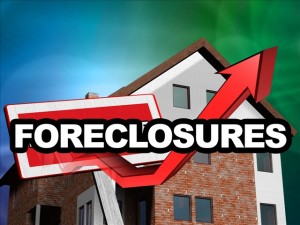
A simple definition of a “Foreclosure” is a legal process by which a defaulted borrower is deprived of his or her interest in the mortgaged property.
The Consequences of Foreclosure
|
DISTRESSED HOMEOWNER |
NEIGHBORING HOMEOWNERS |
SURROUNDING COMMUNITY |
|
|
|
|
|
|
|
|
|
|
Terminology & Process
So there are a few terms that relate to the process of Foreclosure:
- Pre-foreclosure – The period beginning with initial mortgage default up to when the distressed property is sold. The length of what is considered pre-foreclosure varies, depending on state laws.
- NOD – Short for “Notice of Default”, this is an official notice from the lender that the borrower has defaulted on the mortgage. The NOD formally begins the foreclosure process. The NOD also outlines the reinstatement period.
- Reinstatement Period – The time stipulated in the NOD in which the borrower may reinstate the loan- making required payments and bringing one’s account into good standing.
- Short Sale – A situation in which the seller (1) owes more money on the loan than the sale of the property will likely produce on the market and (2) is unable or unwilling to bring money to closing. The seller may or may not be in pre-foreclosure.
- Notice of Sale – If, after receiving the notice of default, the borrower does not or is unable to reinstate the loan, a notice of sale is recorded. The notice of sale explains when and where the foreclosure sale will be held.
- Foreclosure Sale – Also known as the “Sheriff’s Auction”, “Sheriff’s Sale”, or “Trustee’s Sale”, this is when the property is auctioned for sale to the highest bidder (cash sale).
- Redemption Period – The time that gives a distressed owner the right to redeem real estate after the foreclosure sale. Redemption typically requires that the owner pay the sales price, interest, and other costs. Note: not all states provide for redemption periods.
- REO – Acronym for Real Estate Owned, REO is the status of the property when the foreclosure sale is not successful and when ownership of the property is transferred involuntarily to the lender.
Reasons for Foreclosure
The underlying reasons for Foreclosures filings are numerous- here are a few:
-
Job loss
-
Business Failure
-
Payment increase or mortgage adjustment
-
Divorce or death of a spouse
-
Illness
-
Relocation
-
Reduced income
-
Mortgage fraud
-
Predatory lending
